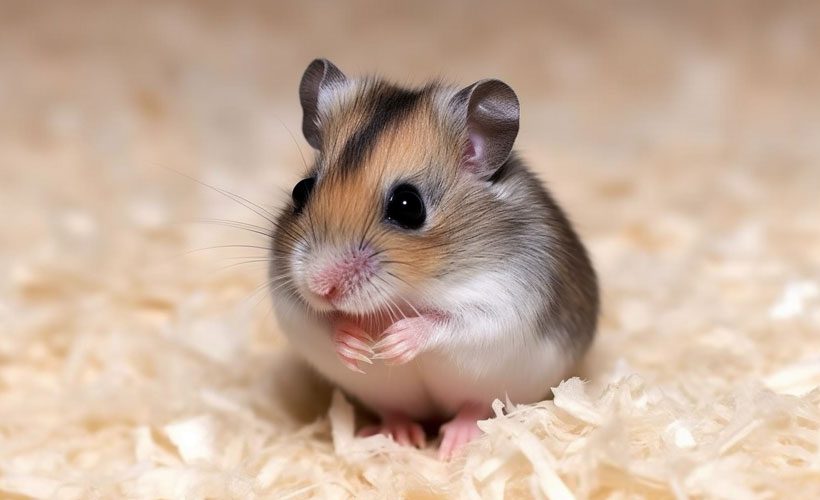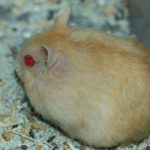Chinese Dwarf Hamster Lifespan: Everything You Need to Know
Life expectancy is one of the major concerns for animal petters. It gives us a rough estimate of the commitment we need to make before adopting the pet. In that sense, you may wonder about the life expectancy of your beloved Chinese dwarf hamster.
So, what is the Chinese dwarf hamster lifespan? The Chinese dwarf Hamster has a lifespan of 2 to 3 years while the average life expectancy stands at around 2 and a half years. Yet the oldest one has ever lived is 4 years!
Many factors negatively or positively contribute to a hamster’s life expectancy, all of which we will discuss down below. So stay tuned!
Chinese Dwarf Hamster Lifespan: Everything You Need to Know
Your hamster reaching the average life expectancy or going way beyond it completely depends on you as the owner.

A lot of factors including dreadful life-threatening illnesses such as wet tails or abscesses negatively affect your hamster’s life span. Lack of human interaction and petting also causes depression in your hamster which could also reduce its life expectancy.
What Enhances Their Lifespan?
- On the other hand, a properly balanced diet and adequate exercise positively reinforce the life expectancy of your hamster.
- Regular vet checkups and a healthy relationship between the pet and the owner go a long way to increasing the pet’s life span.
Nevertheless, before we can discuss the steps to positively reinforce your pet’s life span, we first need to address the factors that negatively hamper their health. The existing problems must first be solved for any quality-of-life improvement for your hamster to take effect.
Hence, below we shall discuss all the factors and illnesses that could exponentially decrease your pet’s life expectancy in great detail.
Wet Tail (Proliferative Ileitis) In Hamster
This is one of the major illnesses that a hamster could suffer from. The wet tail has the highest fatality rate of all the illnesses that a hamster is susceptible to. Without proper care, a wet tail has the potential to kill your hamster even after your pet has recovered from it.

Inexperienced hamster petters often mistake wet tails or rather also known as proliferative ileitis, as diarrhea. Although, the first major symptom of a wet tail is loose stools! Hence if your hamster is having an upset stomach, it is wise to take additional precautions and contact a vet.
Causes
- Stress
- Improper Diet
- Unclean cage
- Sharing the same cage with another hamster infected with a wet tail
Symptoms
- Folded ears
- Diarrhea
- Lethargy
- A soaking discolored tail
Prevention
The main causes of the wet tail are bacteria known as Lawsonia Intracellularis combined with stress. Hence, it is recommended to clean hamster cages often, especially if it is emitting bad odors.
Here’s a video of how to clean a hamster cage properly;
Additionally, it is recommended to use wet tail preventative drops when traveling, as hamsters get very stressed when moved into a new environment.
Diabetes In Hamsters
As deadly as diabetes is to us humans, it is even worse for hamsters. It could very well shorten its lifespan and cause lethargy which will further worsen its condition. Heart problems and kidney failures are not far away if things keep on taking a turn for the worse.

Causes
- The diet contains too much sugar and fat
- Lack of exercise
Symptoms
- Dehydration
- Very frequent urination
- A sudden increase in water intake
Prevention
- Maintaining a proper diet
- Provide plenty of toys to play
- Make sure your hamster is not getting obese
Depression In Hamster
If our hamster seems healthy physically, we often don’t feel the need to check on its mental health. It is a grave mistake! Mental health plays a vital role in determining how well and how long your hamster is going to live.
Hamsters are very active creatures in the wild. If they don’t have a similar environment in captivity where they can expend their daily energy, they get depressed.

Causes
- Improper handling
- Stress
- Lack of interaction
- Lack of toys to play with and expend energy
Symptoms
- Lethargy
- Loss of appetite
- Irregular Sleep Patterns
- Lack of Grooming
- Losing interest in playing with toys
Prevention
- Always give them access to hamster toys
- Regular interaction
- Don’t force them if they don’t want to be pet
- Circulating its diet
Proper Diet For Hamsters
A proper diet does not only prevent any serious illness affecting your hamster, but it also increases the longevity of your pet. As already discussed, hamsters are very active creatures by nature and hence need a lot of carbohydrates daily.

However, while making sure they get enough carbs, we often forget that they also need adequate amounts of vitamins and minerals to stay healthy. Therefore, below we are providing a diet chart to give you a rough idea. An optimized diet plan for your hamster however can only be obtained by consulting a vet.
| Nutrition | Food |
|---|---|
| Carbohydrate | Corn Flakes, Dry Grains, Cooked Brown Rice |
| Vitamins and Minerals | Brocolli, Carrots, Spinach |
| Protein | Commercial Hamster Foods and Treats |
Role Of Exercise For Good Health In Hamster
Hamsters have a tendency to expend their daily quota of energy. They do so in the wilderness by sprinting across their habitat for food and water. Although, in captivity, they do not need to search for their daily needs, they still need to expend their energy to function properly.

Lack of exercise is the main reason for obesity in hamsters which ultimately leads to diabetes. Moreover, if they fail to expend their daily quota of energy, they naturally get depressed. And depression gives rise to excessive stress.
If you would notice, two of the most dangerous illness that a hamster could be inflicted by, wet tail and diabetes, is directly linked to exercising. Hence, we would recommend filling your hamster cage with toys especially a hamster wheel so your hamster never runs out of options to work itself out.
If you’re interested in the lifespan of Chinese dwarf hamsters, you might also find our articles on Fancy Bear hamster lifespan and Syrian hamster care helpful. Our article on Fancy Bear hamster lifespan offers insights into the lifespan expectations and care considerations for Fancy Bear hamsters. Additionally, if you’re looking for information on Syrian hamster care, our article on Syrian hamster care provides guidance on their specific care needs, including diet, housing, and enrichment. By exploring these articles, you’ll gain a better understanding of the lifespan of Chinese dwarf hamsters and the proper care practices for Syrian hamsters.FAQ
Below we will discuss some of the most frequently asked questions about this topic.
Q: What Is A Proper Weight For A Chinese Dwarf Hamster
It is important to keep your hamsters by their recommended weight to avoid obesity and diabetes. The Chinese Dwarf Hamster should weigh around 1 to 2 ounces.
Q: Is Lethargy A Bad Sign For My Hamster?
More often than not, yes! Only if the room temperature is extremely high and humid, only then the hamster might be inactive to decrease its body temperature. Even then, steps to decrease the room temperature should be taken immediately.
Q: Are Fruits Safe For A Hamster’s Diet?
Most fruits are safe if served in small quantities only as a treat. Too many fruits in a hamster’s diet might result in obesity.
Conclusion
We have extensively discussed the factors compromising or reinforcing your hamster’s lifespan. Yet again we are trying to inform the readers, no matter how much attention you give to your hamster’s physical health, it will never be enough.
If the mental health of your pet is compromised, their lifespan will surely be negatively impacted. Hence, before adopting a pet, we better adopt being responsible to care for our pet!




